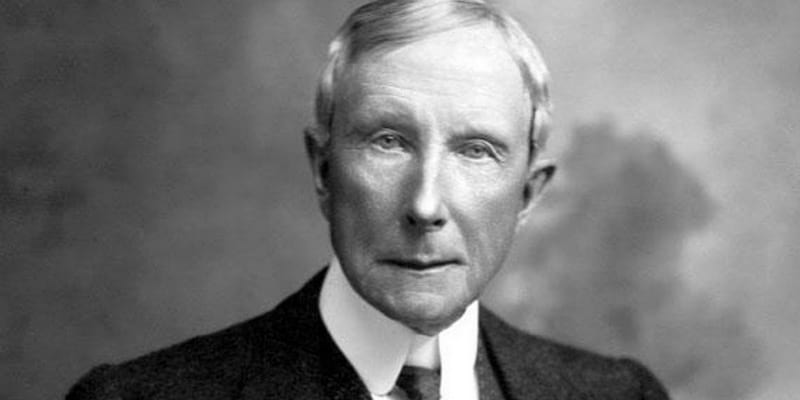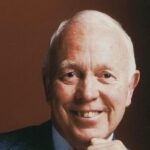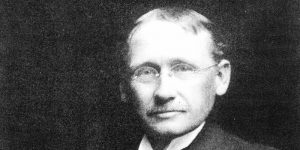John D. Rockefeller biography and quotes

John D. Rockefeller sr. (1839-1937), was an American industrialist and philanthropist, founder of the very successful Standard Oil Company, and one of the richest men of his day. He used his immense fortune to finance ongoing philanthropic endeavours. Over the course of his lifetime, John D. Rockefeller donated more than $500 million to charity. This article covers his biography, quotes and publications.
John D. Rockefeller biography
John D. Rockefeller sr. was born on 8 July 1839 in Richford, New York. His parents were William Avery Rockefeller and Eliza Davison. His father was of German and English heritage, his mother was Scotch-Irish. John was the second of six children produced by his parents’ marriage, and he was the family’s oldest son.
His father didn’t spend much time with the family as he was a travelling salesman who only came home sporadically. William was (in)famous for his questionable business practices and moral ambivalence.
John’s mother, Eliza, on the other hand was a pious housewife who struggled to maintain normalcy within the family. For example, she had John do household chores in exchange for compensation in the form of pocket money.
In 1851, when John D. Rockefeller was twelve years old, the family moved to Owego. Here John joined the Owego Academy. It proved to be short lived, as the family moved to Strongville just two years later. Here John attended high school in Cleveland.
John’s personality in those days is described as obedient, studious and sombre. In Cleveland, he took his first business course at the Folsom Commercial College.
After he graduated, 16-year-old John D. Rockefeller started his first job as assistant bookkeeper at Hewitt & Turtle. There he impressed his manager with his ability to calculate transport costs. John, on the other hand, was not exactly happy with his job.
Therefore, at age 20, he and a business partner started a commission company for produce such as hay, cereals, meats and other products. Together with his partner, Maurice B. Clark, he raised $4,000 worth of capital. The company turned out to be a success. It was profitable and by the end of the fiscal year, it had made its first $450,000.
This was also the period when John D. Rockefeller had noticed that interesting opportunities would develop in the oil business. As a gifted businessman, he and his partner invested a large sum of money in an oil refinery in Cleveland, Ohio in 1863.
The company’s new owners were the Clark brothers, John D. Rockefeller and chemist Samuel Andrews. Within two years, the company became the largest refinery in the region. He then bought out the Clark brothers, creating the company of Rockefeller & Andrews.
John was so good at adapting to his environment, that he was able to profit as much as possible from the rapidly growing industry. This roused the interest of some of his other family members. In 1866, Rockefeller and his brother William Jr. started another refinery in Cleveland.
A year later, Henry M. Flagler joined the business as a partner, leading to the formation of Rockefeller, Andrews & Flagler. At that point, the company owned two refineries in Cleveland and a subsidiary in New York. It became the largest oil refinery in the world and set the stage for the Standard Oil Company.
John D. Rockefeller ended the partnership with Andrews & Flagler in 1868 and founded Standard Oil of Ohio. It soon became the country’s largest oil and kerosene supplier.
In 1870, John and several partners incorporated the Standard Oil Company. As a result of Rockefeller’s ambition and emphasis on economic operations, the company flourished by taking over competitors. He acquired pipelines, terminal facilities and tried to use his power to dominate markets in the United States and beyond.
Until 1882, this strategy meant that Standard Oil practically monopolised the American oil business. Standard Oil’s aggressive strategy was met with disapproval in certain states. In response they developed anti-trust laws, for instance in Ohio. The judge determined that Standard Oil was indeed a monopoly and banned the company.
John D. Rockefeller dodged the ruling by giving up the trust and transferring the possessions to businesses in other states. In 1899, he started the same business, Standard Oil, but this time based in New Jersey. This company was deemed illegal by the Supreme Court in 1911. The company’s hierarchy survived, however.
In 1911, the court rulings forced Rockefeller to split up the company into 34 businesses. The shares were divided and over time the combined businesses of Rockefeller grew into a personal fortune of $900 million. This success created a theory: the Rockefeller Habits.
John D. Rockefeller sr. had been raised by a pious woman, which showed in his actions after he quit running the biggest company in the world. He started to focus on charitable endeavours and became one of history’s most respected philanthropists.
He helped found the University of Chicago in 1882. He donated over $80 million to it. Later he helped found the Rockefeller Institute for Medical Research and the Rockefeller Foundation. All in all, he donated over $530 million to various causes.
John and his wife had five children, of which one girl, Alice, died very young. Rockefeller died on 23 May in 1937 in Ormond Beach, Florida. His legacy lives on. Rockefeller is still considered to be one of America’s leading business tycoons and is credited with helping to make the United States the country it is today.
His only son, John Jr. Rockefeller, helped his father as a philanthropist for as long as he lived. He was to continue his father’s legacy during the Second World War and helped found the United Service Organizations (USO).
After the war, he donated land to the UN headquarters in New York City. He also donated over $5 million to the Lincoln Center for the Performing Arts in New York. This company contributed to the restoration of Colonial Williamsburg in Virginia.
John D. Rockefeller quotes
- “If you want to succeed you should strike out on new paths, rather than travel the worn paths of accepted success.”
- “I know of nothing more despicable and pathetic than a man who devotes all the hours of the waking day to the making of money for money’s sake.”
- “If your only goal is to become rich, you will never achieve it.”
- “I believe that every right implies a responsibility; every opportunity an obligation; every possession a duty.”
- “The most important thing for a young man is to establish credit – a reputation and character.”
- “Good leadership consists of showing average people how to do the work of superior people.”
- “I believe in the dignity of labor, whether with head or hand; that the world owes no man a living but that it owes every man an opportunity to make a living.”
- “Don’t be afraid to give up the good to go for the great.”
- “Own nothing, control everything.”
- “The secret of success is to do the common things uncommonly well.”
Books and publications
- 1994. Dear Father/ dear Son: Correspondence of John D. Rockefeller and John D. Rockefeller, Jr. Fordham Univ Press.
- 1991. Worthwhile Places: Correspondence of John D. Rockefeller, Jr. and Horace M. Albright. Fordham Univ Press.
- 1940). John D. Rockefeller; the heroic age of American enterprise.
- 1973. The second American revolution: some personal observations. Harpercollins.
- 1916. Random reminiscences of men and events. Doubleday, Page.
- 1984. John D. Rockefeller Interview, 1917-1920. Meckler Pub.
- 1978. Population growth: The role of the developed world.
How to cite this article:
Janse, B. (2019). John D. Rockefeller. Retrieved [insert date] from Toolshero: https://www.toolshero.com/toolsheroes/john-d-rockefeller/
Original publication date: 03/26/2019 | Last update: 08/09/2023
Add a link to this page on your website:
<a href=”https://www.toolshero.com/toolsheroes/john-d-rockefeller/”>Toolshero: John D. Rockefeller</a>










